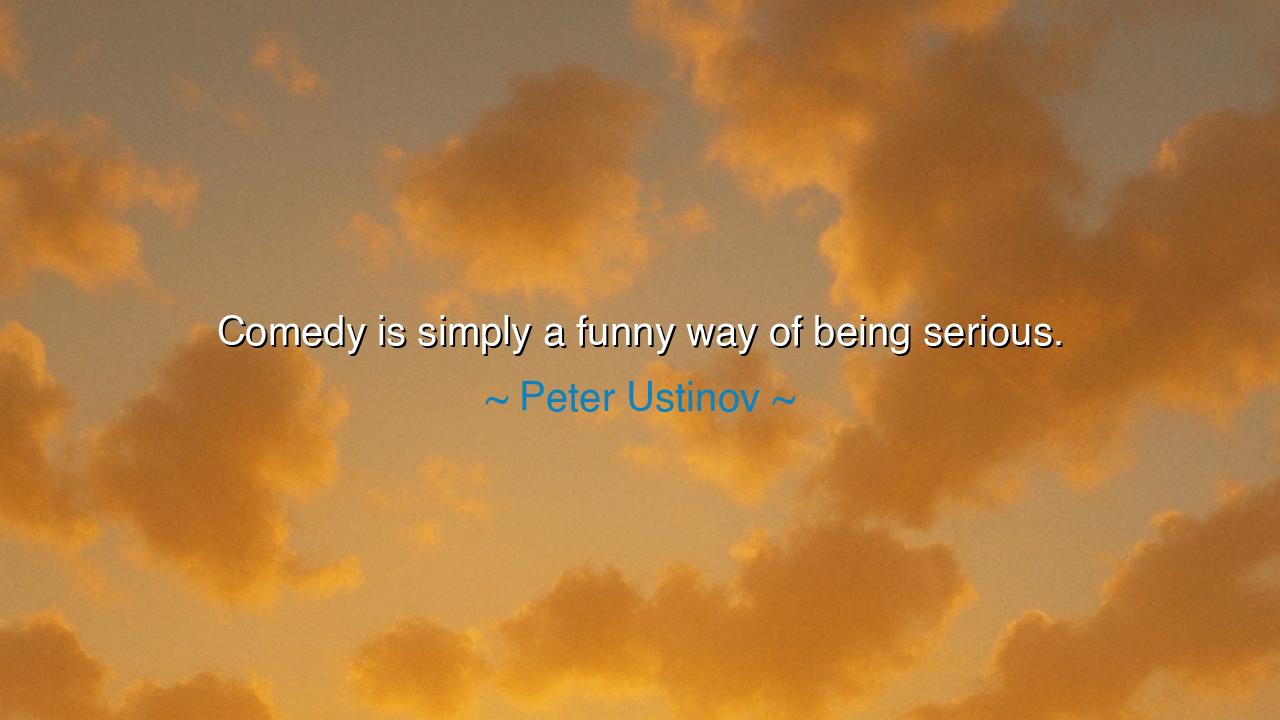
Comedy is simply a funny way of being serious.






“Comedy is simply a funny way of being serious.” — Peter Ustinov
There is a deep and paradoxical wisdom within these few words, spoken by the great actor, writer, and philosopher Peter Ustinov. He unveils the hidden face of comedy, not as mere entertainment, but as one of the most profound expressions of truth. To laugh, he reminds us, is not to forget the weight of life — it is to bear it more gently. Comedy, in its highest form, is the art of being serious through laughter, of revealing pain without bitterness, and of confronting the absurdity of existence with grace. It is a mirror polished by humor, showing us our folly while forgiving it.
The ancients knew this truth well. The Greeks, those lovers of both wisdom and theatre, called comedy a “divine disguise.” Aristophanes, the father of ancient comedy, used laughter to speak truths that others dared not voice. Through jest, he exposed corruption, mocked arrogance, and revealed the vanity of men who believed themselves gods. His laughter was not cruelty, but courage — a shield against tyranny, a balm for the weary spirit. In his words and plays, one finds the very essence of Ustinov’s insight: that humor is a vessel for truth, and truth is often too heavy to carry without a smile.
Consider the story of Charlie Chaplin, that silent philosopher of the modern age. In an era of war and despair, when the world reeled from the march of dictators and machines, Chaplin dared to laugh. His little tramp, poor and powerless, stumbled through hunger, cruelty, and ridicule — yet he smiled. In The Great Dictator, Chaplin turned laughter into a weapon sharper than any sword. He mocked tyranny, yes, but beneath the laughter was sorrow and defiance — the seriousness of compassion disguised as humor. His comedy was not escape; it was resistance. It was a funny way of saying something deadly serious: that humanity must never surrender its soul.
To say that comedy is serious is to understand that laughter is not the enemy of truth, but its messenger. The fool in the king’s court, long ago, was the only one who could tell the truth without losing his head. The jester’s bells disguised wisdom. His antics were masks, his laughter a form of courage. Through humor, he spoke the words that the wise feared to utter aloud. Thus, from the courts of kings to the stages of our time, the true comedian is not the one who mocks for amusement, but the one who awakens through mirth.
The origin of Ustinov’s words lies not only in the craft of performance, but in the philosophy of balance. Life itself is both tragic and absurd — a dance of beauty and sorrow, light and shadow. The wise man does not deny the darkness; he illuminates it with laughter. When we laugh at our misfortunes, we reclaim power over them. When we find humor in pain, we declare that the spirit cannot be broken. Thus, comedy becomes a sacred act — the transformation of suffering into understanding, and of fear into freedom.
Yet, how often do we forget this? How often do we treat laughter as trivial, and seriousness as the only path to wisdom? But the ancients would tell us — and Ustinov would remind us — that a man who cannot laugh cannot see clearly. For humor reveals what solemnity conceals. It exposes pride, deflates vanity, and teaches humility. To laugh at oneself is to be free from illusion. It is to look at one’s flaws not with despair, but with mercy. Comedy, then, is a teacher in disguise — playful, sharp, and profoundly human.
So, my child, take this lesson to heart: learn to be serious through laughter. When life weighs upon you, let humor be your companion. When you face injustice, use wit as your sword. When you fall, laugh — not to deny the pain, but to rise above it. Seek truth not only in solemn faces, but in smiling ones, for often the fool speaks more wisely than the scholar. And when you share laughter with others, know that you are binding hearts with invisible thread — the bond of shared understanding that only humor can forge.
For in the end, to laugh deeply is to live wisely. It is to stand at the edge of tragedy and sing. It is to face the storm not with fear, but with a grin. And so, as Ustinov taught us, remember this: comedy is not the opposite of seriousness — it is its truest form, clothed in joy, lit by courage, and eternal as the human spirit.






AAdministratorAdministrator
Welcome, honored guests. Please leave a comment, we will respond soon